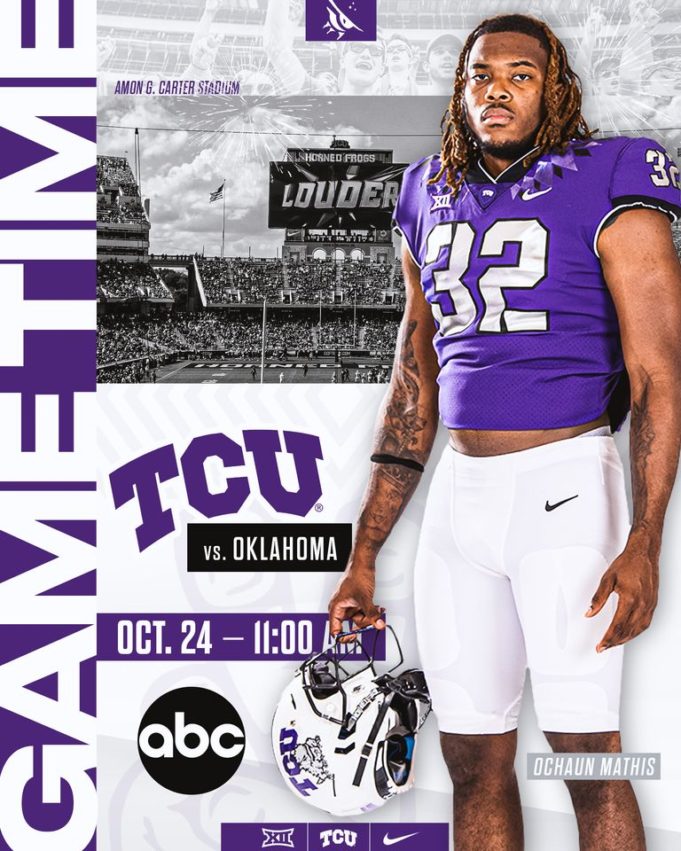Bye weeks are such a circumstantial time. If your team is rolling, it’s a beautiful opportunity to kick your feet back and release the jaw-clenching stress of praying they aren’t upset that week. When your squad is flailing — as I think we all can agree the Frogs are — it’s a respite from another gut punch when you can enjoy watching ranked teams hopefully lose for your amusement and revel in the dismay of an adjacent fanbase. But, honestly, I have no idea what to make of this purple and white iteration. I know from conversations and trolling of message boards that many friends of the Frog are delving into a dark place. Sonny Cumbie voodoo dolls aren’t making their way into the TCU Facebook Marketplace groups. Yet. But the overall impression is that spectators are sick of the spread, and who can blame them? It’s arduous watching this offense when it isn’t firing on all cylinders. Quarterback Max Duggan (#15) is obviously an improved specimen this season, throwing more confidently and accurately, while still retaining his running prowess. But everything feels bleak, right? I’ll attribute it to a global pandemic or political strife or maybe even a bad memory, because things are fine. Fine might seem terrible, but put down your hyperventilation bag, or handle of grain alcohol, or whatever you use to escape reality, and take a trip back in time with me to the year 2003.
TCU belonged to the most patriotic conference, the one of the USA. The Frogs and third-year head coach Gary Patterson were walking on air after a conference championship season the year before which culminated with a Liberty Bowl appearance and a 17-3 victory over the Colorado State Rams on a rainy New Year’s Eve morning in Memphis. Patterson’s defense stifled the run-heavy Rams to a solitary field goal, celebrated by the Colorado State ROTC firing a howitzer artillery cannon that earthquaked the bleachers, scaring the living shit out of yours truly. Patterson’s 10-win season and final AP ranking of 22nd raised previously modest Funkytown expectations to a fever pitch heading into the next season. What followed was game after game of palpitation-inducing anticipation of knowing that if our Frogs so much as stumbled, our ranking and proverbial world would be shattered instantaneously. The Frogs began that season ranked a humble 25th in the AP poll and survived spats with perennial powers such as Tulane, Arizona (the marquee big-name matchup of that season), South Florida, UAB, and Louisville. All of the aforementioned victories were three-point wins and ecstatic agony to watch. Our Frogs reached an unthinkable 10th ranking in the AP before losing at Southern Mississippi in the second-to-last game of the year. That season concluded with a homestand bowl loss against Boise State in what would become a multi-season “best of the rest” rivalry.
Those were the days. TCU was just a middleweight private school punching above their weight class two to three times a year in must-win games that would secure their relevance for the rest of the season. We were a test case in the BCS era. Could a middle-tier conference produce a team regarded highly enough by pollsters to elevate them past one- and two-loss teams in the big money conferences? Maybe even give them a crack at a national championship? Spoiler alert: It never worked. Even the Boise State Broncos, whose Statue of Liberty trickeration punctuated the upset of Oklahoma years later in the Fiesta Bowl, couldn’t bust that BCS turf ceiling. The modern trailblazers — Central Florida — couldn’t, either. But TCU is past that now. We’re big dogs. We’ve conquered a Rose Bowl and have a proud tradition including national championships before the second World War, right? This mindset is both correct but ultimately flawed. The cold truth is that prior to the year 2000 — the season Patterson took over for a departing Dennis Francione for the bowl game — our Frogs hadn’t been recognized in the AP poll in an almost 41 years, ya know, a decade before Woodstock, in the early stages of a conflict that would become known as the Vietnam War. We’re in dangerous territory, and our privilege is starting to show. It hurts to lose close contests to Iowa State, who is a remarkably complete team this season and on trajectory to be legitimately relevant for the next several years. It stings to lose to Kansas State, who we all perceive as an inferior agricultural dinosaur without explosive athletes. But, while our Horned Frogs were duking it out in CUSA and the Mountain West, the Wildcats enjoyed a 21-year stretch of winning a minimum of nine games in a big-boy conference 13 times. That other purple school can laud seven 11-win seasons during the same timeframe.
The worst possible situation TCU fans and boosters can aspire to is to become the Texas Longhorns. Sure, we want that level of coin raining down on our programs, but they’re the most acute example of not knowing how good you have it until it’s gone. Bevo’s success is nearly impossible to overstate. UT is a blue-blood program in the landscape of major college football, but success has ruined them, expectations have devastated them, coveting has buried them. TCU — who hasn’t been the same since the departure of quarterback Trevone Boykin and receiver Josh Doctson — has beaten the Longhorns seven of the nine times they’ve met as conference foes. UT has accumulated double-digits in the win column once in the last decade. Austin faithful chased away an accomplished coach and national champion in Mack Brown who was replaced by Charlie Strong who was canned after three seasons and one bowl appearance. Meanwhile, Mack Brown is guiding a team donning the ugliest blue imaginable with a mascot no one understands into an AP Top-5 ranking. (Before Saturday, they were.) There’s a common thread between these teams, because UT hasn’t been the same since the departure of quarterback Vince Young. Even the best teams are dependent on special players to make special plays. Sometimes — heck, most of the time — these are things high-school rankings and recruiting coordinators can’t foresee.
Our Frogs host the Oklahoma Sooners Saturday morning. These Sooners don’t seem quite as potent as recent versions, but they’re still plenty dangerous. Patterson’s defense — with the exception of the pass rush — has been perfectly serviceable, and OU’s defense seems, as usual, the cure for the common offense. I don’t have a great feeling about our Frogs finishing with more points at the end, but we have three opponents in common with the Sooners and all those games were close. One blown coverage, interception, or special teams mishap will be the difference against the crimson and creme. Like in 2003, the Frogs will need to be near perfect to pull this one off and stay relevant in a conference that is currently cannibalizing itself at an unprecedented rate but, no matter the outcome, maintain the perspective that our team and fandom will survive if this season continues to underwhelm. There isn’t a short-term solution to building or maintaining a prominent program. We’ve been an overachieving middleweight, but it’s much better living the life of an oscillating heavyweight. Whatever you do, don’t envy the crosstown Ponies. SMU is living their own little 2003 season right now, clenched-jaw praying they can stay perfect enough to barely fall short of being taken seriously.












